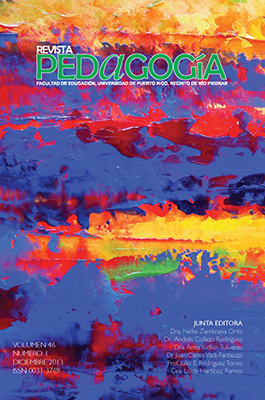Abstract
This paper seeks to explain human affectivity from the cultural historical perspective proposed, in the first half of the twentieth century, by Lev Semyonovich Vygotsky. Thus, the subject is approached from a critical angle aiming to elucidate the dialectical and mutually modifying relationship between subjectivity and reality. For this purpose, the article re-examines different theoretical and philosophical approaches about the emotions that preceded and followed the work of Vygotsky, which is placed in the context that enabled its development. It also highlights the valuable contributions made by this author on the subject, finalizing with some implications on the historical cultural approach for pedagogical practice.
How to cite:
Rojas-Madrigal, C. (2013). La afectividad humana desde el enfoque histórico cultural: Dialéctica entre subjetividad y realidad. Pedagogía, 46(1), 19-39. Retrieved from https://revistas.upr.edu/index.php/educacion/article/view/16414
References
Álvarez, A. & Del Río, P. (2007). Escritos sobre arte y educación creativa de Lev S. Vygotsky. En A. Álvarez, A y P. del Río (Eds), La imaginación y la creatividad en la infancia (1930) (pp. 25-47). Madrid, España: Fundación Infancia y Aprendizaje.
Blanck, G. (1990). Vygotsky: The man and his cause. En L. Moll (Ed.), Vygotsky and education: Instructional implications and applications of sociohistorical psychology (pp. 31-58). Cambridge: Cambridge University Press.
Descartes, R. (1641/1992). Meditaciones metafísicas. México: Editorial Porrúa.
Chóliz Montañés, M. (2005). Psicología de la emoción: el proceso emocional. Recuperado de http://www.uv.es/=choliz
Freire, P. (2002). Pedagogía de la autonomía: saberes necesarios para la práctica educativa. (7ma. ed.). México: Siglo Veintiuno.
Hoyos, I. (2010). Spinoza contra la extirpación estoica de las "pasiones". Δαίμων: Revista Internacional de Filosofía, Suplemento 3, pp. 59-66.
González Rey, F. L. (2010). Las categorías de sentido, sentido personal y sentido subjetivo en una perspectiva histórico-cultural: un camino hacia una definición de subjetividad. Universitas Psychologica, 9(1), 241-253.
Lagarde, M. (2005). Los cautiverios de las mujeres: madresposas, monjas, putas, presas y locas (4ta. ed.). México: Universidad Nacional Autónoma de México, Colección Posgrado.
León Florido, F. (1993). La sabiduría del cuerpo. Madrid, España: La Productora de Ediciones.
Morillo Velarde, D. (2001). René Descartes. Madrid: Ibérica.
Rodríguez Arocho, W. (2010). Los conceptos de vivencia y situación social del desarrollo: reflexión en torno al lugar en el modelo teórico de Lev S. Vygotski. En S. Aburto Morales & C. Meza Peña (Comps.), Tutoría para el desarrollo humano: enfoques (pp. 73-92). Monterrey, México: Universidad de Nuevo León.
Rosa, A. & Montero, I. (1990). The historical context of Vygotsky‘s work: A sociohistorical approach. En L. Moll (Ed.), Vygotsky and education: Instructional implications and applications of sociohistorical psychology (pp.59-88). Cambridge: Cambridge University Press.
Rubinstein, S. (1963). El ser y la conciencia. México: Editorial Grijalbo.
Trueba Atienza, C. (2009). La teoría aristotélica de las emociones. Revista Signos Filosóficos, 11(22), 147-170. Recuperado de http://redalyc.uaemex.mx/src/inicio/ArtPdfRed.jsp?iCve=34316032007
Van der Veer, R. (1987). El dualismo en la psicología: un análisis Vygotskiano. En M. Siguán (Coord.), Actualidad de Lev. S. Vygotski (pp. 87-111). Madrid: Anthropos.
Vila, J. y Fernández-Santaella, M. del C. (2003). Emoción y modulación de reflejos: nuevas perspectivas psicofisiológicas. Revista Electrónica de Motivación y Emoción, 6(14-15), 1-36. Recuperado de http://reme.uji.es/articulos/avillj3021602105/texto.html
Vygotski, L. S. (1932/2001). Obras escogidas II: problemas de psicología general. Madrid, España: A. Machado Libros.
Vygotski, L. S. (1933/2004). Teoría de las emociones: estudio histórico psicológico. Madrid, España: Ediciones AKAL.
The contents published in the Puerto Rico Journal of Education is freely distributed under open access practices, in accordance with the Creative Commons license, Attribution-NonCommercial 4.0 International (CC BY-NC 4.0). Through these principles, the journal and its authors allow readers to access, reproduce and share articles in full text. Users should give credit to authors in a reasonable way without suggesting they have their support. Under no circumstances, readers may make use of the contents for commercial purposes. The authors retain copyright on their works.

